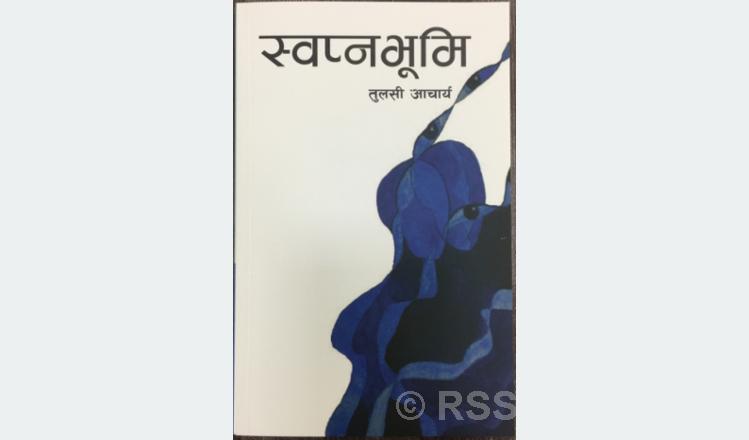

The book under review is a novel, ‘Swapnabhumi’, a dreamland, penned by Tulasi Acharya, PhD. The novel concentrates largely on struggles the Nepali students face in the US while pursuing university education, and finding jobs for livelihood.
Major character in the novel is Deepak, who undergoes tremendous struggles to complete his university education in the US. Various themes such as migration, motherland, identity, culture, love and sex, economy and study, separation, relations and freedoms can be explored in this novel.
It depicts the dream of today’s Nepali youths, who see their future in foreign land. It is however a worrying trend. It is natural for humans to chase change and success in life. For this to happen, migration is imperative. People from Nepal, a poor and backward country, obviously move to foreign land aspiring for better life- better education, better job and income, happiness and luxury, freedoms. All across the globe, Nepalis are scattered now. Those living abroad also link their individual success to family success, but at the cost of emotional setback, separation and nostalgia.
Reading the novel, it makes us wonder whether foreign land or motherland is the real dreamland. Answers may depend on one’s perception, time and contexts. How one goes through differing situations- toils and tribulations, woes and awes- may teach him/her to know the real dreamland. Evidently, the major character Deepak in the novel initially thinks of the US as the dreamland.He dreams to pursue higher education, marry a foreign girl, settle a family and become a professor at a prestigious university, which he thinks of as a happy life and achievement of a dream. In every stumble and setback, he consoles himself that if he is cast down, his American dream will be dashed and dampened. So, he encourages himself to stay unfazed despite troubles and suffering he faces to generate money. It is quite appealing and appalling that a Nepali student who reaches America for higher education has to worry more about money than education. Earning is primary concern and education is secondary. The status of most of the Nepalis is poor- washing dishes, cleaning rooms, helping in restaurant works. Time and again, the Nepalis who had been there earlier, remind Deepak that most of the Nepalis’ job in the US is washing dishes! He himself becomes happy to find the job of dish washing, but it creeps him so bad that he is humiliated and belittled by himself.
But, the experiences he had in the course of pursuing higher education finally compels him to return to his motherland, the ultimate dreamland. Ultimately, writer Acharya brings reference to Mahakavi Devkota’s seminal essay, ‘Ke Nepal Sano Cha? (Is Nepal small?) He celebrates the lines from the essay, finds his own provenance, the real dreamland.
Due to clash of cultures, he fails to secure marriage with a foreign girl, Malisa, who was classmate. Malisa was of Irish origin and Catholic, strict in precepts.A man of Hindu family, Deepak’s dream to settle family with her was frustrated after Malisa rejected his perception towards her was dubbed faulty. Malisa’s examination on Deepak was meticulous and shrewd. It was a cultural shock and a tragedy in love affairs.
The pang of separation from family and nostalgia made Deepak sick in the US. The taste of ‘Dal Bhat Tarkari’ was unrivalled. The festivals as Dashain and Tihar, and camaraderie with friends were badly missed. The foods in the US failed to satiate him. The jobs for paying university fees failed to satisfy him. What he enjoyed was the development of physical infrastructures. There was no emotion, no love, but only monotonous work, hard work. He however learnt many things- value of time, respect for labour. We Nepalis quickly belittle washing dishes, which is also a work. He learns how to respect every minor work.
Living with friends from different cultures was also a difficulty. It was sheer discomfort for him to see and hear the splurge of love between his apartment mates- Vanisa and Lucas. He stayed with them immediately after reaching the US. They had received him at the airport after he landed there.
Deepak changes his flat time and again to stay with comfort- sometimes with Nepali as well. He is both assisted and harassed by senior Nepalis. To their gross behaviour on his naivety, he wants to derogate them, but cannot. He stays mute because what he needs is money to pay university fees. While working at Bikas’ restaurant, he faces his real test in life in the US. With misery, he finds the US hollow and wants to return home, but cannot.
“The only thing in the US is- there are sleek and wide roads, posh cars, no vehicular strike. Physical facilities galore. Otherwise, there is nothing at all here!”A Nepali says in a gathering that Deepak was listening with keen interest.
He compares the US as the ‘Continent of Circe’. Deepak further observed, “All are living in camouflage of happiness. None knows each other’s plight, pain and suppression.” He finds blatant contradictions in the US- freedom but time-bound!.
Moreover, he finely shares the gist, “Most of the Nepalis in the US are not emotionally happy. Neither can they leave the US and return to Nepal. That is to say, they have both love and hate relations with Nepal and the US.” It is a reflection of split identity. The book is published by Shikha Books. It costs Rs 425.
(Narayan Prasad Ghimire)